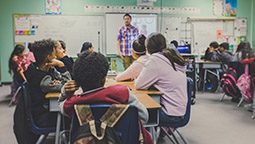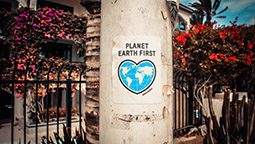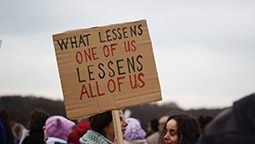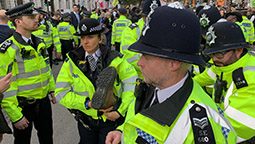After the Euros Final, the abuse directed at England’s Black football players has been horrific. Michele Theil argues that the team deserves respect for more than just their skills on the pitch.
On Sunday 11 July, the England national football team participated in its first international tournament final in 55 years. What should have been a historic occasion to celebrate – no matter the result – was marred by the actions of a few. After successive missed penalties from three British Black players, Marcus Rashford, Bukayo Saka and Jadon Sancho dealt with a torrent of disgusting racist abuse.
While football is almost akin to a religion in the UK, this is an unacceptable and horrendous response to these young men’s bravery and courage.
Rashford, Saka, and Sancho were the primary targets of this abuse — though this was extended to other players as well. Aged 23, 19, and 21 respectively, the three showed tenacity walking up to take a penalty with the eyes of the country on them; naturally, missing one is always a possibility. In the wake of the aftermath, the three players received a wave of support and condemnation. It has been heartening to see people flooding Rashford, Saka, and Sancho’s social media with positive messages, telling them that they did well in the final and that (most of) England is behind them. Plus, after it was defaced on the night of the final, we have seen how scores of Mancunians left heartfelt messages at Rashford’s mural in central Manchester.

Jadon Sancho. Credit: Wikimedia Commons
However, some of the disapproval of this racism has come in the form of praising the players for their activism or football prowess. Rashford, in particular, has been lauded for his work in getting the government to give free school meals to children over the school holidays last year, while Sancho has previously been praised for his previous statements of anti-racism. Saka is revered for his astonishing sporting ability at such a young age. It is undoubtedly true that all three players are setting great examples for the country in how to play and act well, but they deserve to be treated with respect and not abused simply because they are human, not because they scored a certain amount of goals or fed over a million children by forcing the government to do their jobs.
There should be no tolerance of racist abuse, no matter who the victims or what they’ve done in the past.
The goals scored and skills presented by the players of colour on the team throughout the Euros were celebrated over and over again, and though this has no bearing on the fact they shouldn’t be racially abused, it is an interesting point to mull over. 11 of the 26-man England team are people of colour, a historic number in comparison to previous team line ups – while some have pointed to this representation as proof that racism no longer exists, the difference in how they’re treated when they win and when they lose is proof of the opposite.
Fundamentally, it is our human right to not be abused for the colour of our skin, to be discriminated against both structurally or individually because of who we are. This right is not contingent on how much we’ve done for our country, on how ‘nice’ we are, or on how successful we are in plugging the gaps that austerity has created through activism or community outreach.

Marcus Rashford Playing For England. Credit: Wikimedia Commons
This rhetoric puts Rashford, Saka, and Sancho at the centre of the model minority myth, separating people of colour, and especially Black people, into ‘good’ and ‘bad’ sides. ‘Good’ people of colour are undeserving of the ire directed at them by racist white British people because they are contributing to British society in some way, or representing the country on an international stage. ‘Bad’ people of colour, those who are not seen to be contributing to society, are contrastingly undeserving of respect and of being allowed to live free of racial abuse in this country.
if all this proves anything, it is what a problematic concept #blackexcellence truly is. sick of black people only being valued when we're excellent, useful + strong. we have the right to be mediocre, make mistakes + show vulnerability. ALL black lives matter however we live them
— karla marie sweet (@karlamsweet) July 13, 2021
We should praise Rashford, Saka, and Sancho for their achievements – of which there have been many – but we should not use their achievements to justify anti-racism. There should be no tolerance of racist abuse, no matter who the victims or what they’ve done in the past.
The wave of international support for the players has been extensive, with the FA and the players themselves putting out statements expressing their disappointment and commitment to anti-racism. The FA’s response was extremely quick and unequivocally explained that the organisation was “appalled by the online racism that has been aimed at some of our England players on social media.” Rashford, Saka, and Sancho all posted on their social media apologising for the penalties while also standing proud for what they achieved and who they are.
It is surely everyone’s hope that we won’t have to wait another 55 years to see this country reach the finals of a major international football tournament, and when we do, we should support every player for their remarkable achievements no matter the outcome.
The views expressed in this article are those of the author and do not necessarily reflect the views of EachOther.





























